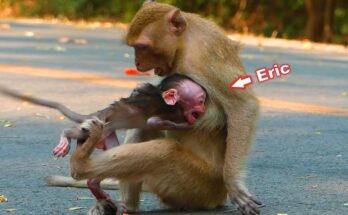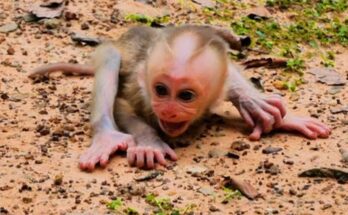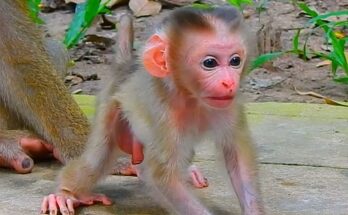After Giving Birth, Mother ROZY Abandoned the Newborn Monkey Hybrid
In the quiet early hours of dawn, deep within the lush green canopy of the tropical forest, a moment of life unfolded that should have marked the beginning of a bond between a mother and her child. Rozy, a full-grown female macaque known to local researchers for her strong character and history of successful rearing, had just given birth. But what followed was not the nurturing embrace expected from a seasoned mother. Instead, it was a moment that stunned both observers and fellow members of the troop—Rozy abandoned her newborn.
The infant, a tiny hybrid monkey, lay still on the forest floor, its fur slightly damp and its body trembling in the cool morning air. Unlike typical macaque newborns, this baby bore unfamiliar traits: a longer snout, unusually pale skin around the eyes, and limbs that seemed out of proportion. It was clear that the infant was not a pure macaque. The hybrid appearance immediately raised questions about the father’s identity—likely from another monkey species, possibly due to overlapping territories or moments of vulnerability during mating season.
Rozy’s rejection was swift and cold. Within minutes of delivery, she stood up, glanced briefly at the squirming infant, and walked away without a sound. Her troop, confused but not interfering, watched as she rejoined them, grooming herself and resuming normal social activities. The newborn was left behind, alone and crying out faintly in the underbrush.
For researchers on the ground, this was both heartbreaking and significant. Hybrid births in the wild are rare, and maternal rejection of hybrids is even more so, though not unheard of. In the wild, instincts often dictate survival decisions. A mother sensing that her baby is “different” may choose not to invest time and energy if the infant appears weak or genetically incompatible with the group’s future success.
Camera traps and behavioral notes taken by the conservation team documented every moment. Rozy’s body language showed no signs of distress. She groomed other troop members as if nothing had occurred. Meanwhile, the tiny hybrid’s cries grew weaker as the hours passed.
Despite the tragic turn, the team decided to intervene. A veterinarian carefully retrieved the infant and brought it to a nearby wildlife rescue center. There, the baby was placed in an incubator, monitored closely, and given formula milk. Though fragile, it showed a surprising will to survive.
Rozy’s decision to abandon her baby may seem cruel, but in the context of the wild, it reflects the harsh choices animals make for the survival of themselves and the group. The story of this abandoned hybrid now takes a different path—one shaped not by its birth mother, but by human compassion and scientific curiosity.
As for Rozy, she continues to lead her troop, her place in the social hierarchy unchanged. But her story has left a mark on those who witnessed it—a haunting reminder of nature’s complex balance between instinct, survival, and the fragile beginning of life.


